Enhanced TDS
Identification & Functionality
- Additives Included
- Blend
- Yes
- Chemical Family
- Country of Origin
- Function
- Flame Retardant, Resin
- Plastics & Elastomers Functions
- Polymer Name
- Product Code
- MITM14920
- Single Ingredient
- No
- Technologies
- Product Families
Features & Benefits
- Labeling Claims
- Materials Features
Applications & Uses
- Plastics & Elastomers End Uses
- Plastics & Elastomers Processing Methods
- Markets
- Applications
- Processing Information
- Typical melt temperature (Min / Recommended / Max) : 210°C / 220°C / 230°C.
- Mold temperature : 20 - 60°C
- Drying time and temperature (only necessary for bags opened for more than two hours) : 4-6 hours at 80-90°C.
Properties
Technical Details & Test Data
- Technical Data
Viscosity-shear Rate
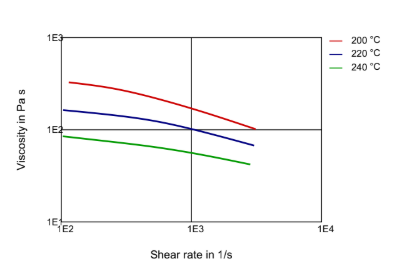
Shearstress-shear Rate
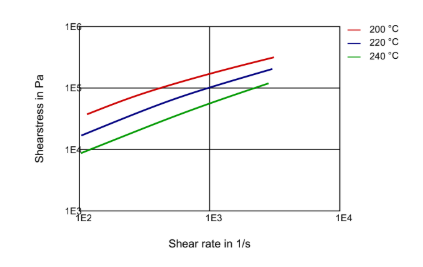
Dynamic Shear Modulus-temperature
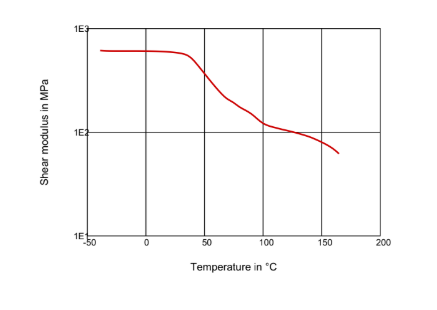
Stress-strain
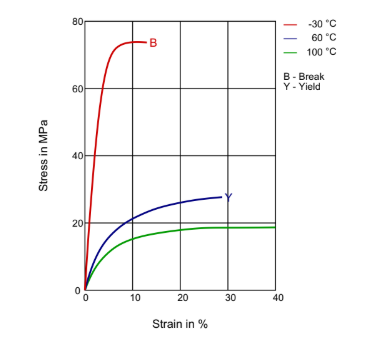
Stress-strain
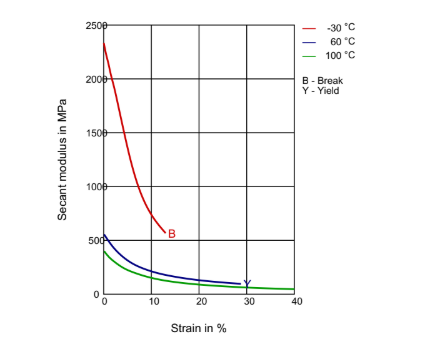
Packaging & Availability
- Packaging Type
Principal Information
- Group Principal Number
- S000003
- Principal
Other
- Color (SDS)
- Clear colorless
- Insoluble in (SDS)
- Water
- Item Number
- Other Hazards
- Processing may release vapors and/or fumes which cause eye, skin and respiratory tract irritation, Contains high molecular weight polymer(s). Effects due to processing releases: Irritating to eyes, respiratory system and skin, Prolonged or repeated exposure may cause: headache, drowsiness, nausea, weakness, (severity of effects depends on extent of exposure), This product may release fume and/or vapor of variable composition depending on processing time and temperature.
- USA/DOT UN Number
- Not Applicable
- Application Information
Value Units Test Method / Conditions Application Temperature 235.0 °C °C - Electrical Properties
Value Units Test Method / Conditions Comparative Tracking Index 600.0 - IEC 60112 Dielectric Constant 3.0 - IEC 60250 at 100 Hz, dry Dielectric Constant 3.0 - IEC 60250 at 1MHz, dry Dielectric Strength 28.0 kV/mm kV/mm IEC 60243-1 Dissipation Factor 0.0221 tan δ tan δ IEC 60250 100Hz, dry Dissipation Factor 0.018 tan δ tan δ IEC 60250 1MHz, dry Volume Resistivity min. 10000000000000.0 Ω-cm Ω-cm IEC 60093 - Mechanical Properties
Value Units Test Method / Conditions Charpy Impact Strength 83.0 kJ/m² kJ/m² DIN EN ISO 179-1 at 23°C, condensed Charpy Impact Strength 38.0 kJ/m² kJ/m² DIN EN ISO 179-1 at -30°C, condensed Charpy Impact Strength 4.0 kJ/m² kJ/m² ISO 179-1EA at 23°C, condensed, notched Charpy Impact Strength 3.0 kJ/m² kJ/m² ISO 179-1EA at -30°C, condensed, notched Flexural Modulus 1140.0 MPa MPa ISO 178 at 23°C, condensed Hardness 69.0 Shore D Shore D condensed Hardness 69.0 Shore A Shore A ISO 868 condensed Nominal Strain at Break min. 50.0 % % ISO 527-1 condensed, at break, nominal Nominal Strain at Break min. 50.0 % % ISO 527-2 condensed, at break, nominal Strain at Yield 45.0 % % ISO 527-1 condensed Strain at Yield 45.0 % % ISO 527-2 condensed Tensile Modulus 1830.0 MPa MPa ISO 527-1 condensed Tensile Modulus 1830.0 MPa MPa ISO 527-2 condensed Weld Load 2.16 kg kg - Physical Properties
Value Units Test Method / Conditions Density 1090.0 kg/m³ kg/m³ ISO 1183 condensed Density 1090.0 kg/m³ kg/m³ ISO 1183 dry basis Humidity Absorption 0.6 % % ISO 62 Melt Flow Index max. 103.0 - ASTM D1238 Melt Volume-Flow Rate 95.0 cc/10min cc/10min ISO 1133 Melting Point 189.0 °C °C ISO 11357-3 at 10°C/min Melting Point 189.0 °C °C ISO 11357-1 at 10°C/min Mold Shrinkage 0.9 % % ISO 2577 normal, dry Mold Shrinkage 0.9 % % ISO 2577 parallel, dry Mold Shrinkage 0.9 % % ISO 294-4 normal, dry Mold Shrinkage 0.9 % % ISO 294-4 parallel, dry Storage Temperature max. 140.0 °F °F Thickness 1.6 mm mm Thickness 0.8 mm mm Dry Water Absorption 2.0 % % ISO 62 - SDS Physical and Chemical Properties
Value Units Test Method / Conditions Autoignition Temperature (SDS) 788.0-842.0 °F °F Bulk Density (SDS) 550.0-650.0 kg/m³ kg/m³ Decomposition Temperature (SDS) min. 464.0 °F °F Lower Explosion Limit (SDS) 90.0 % % at 85⁰C - Shelf Life & Stability
Value Units Test Method / Conditions Shelf Life 2.0 yr yr - Thermal Properties
Value Units Test Method / Conditions Coefficient of Thermal Expansion 0.000102 /K /K ISO 11359-1 parallel, dry Coefficient of Thermal Expansion 0.000102 /K /K ISO 11359-2 parallel, dry
